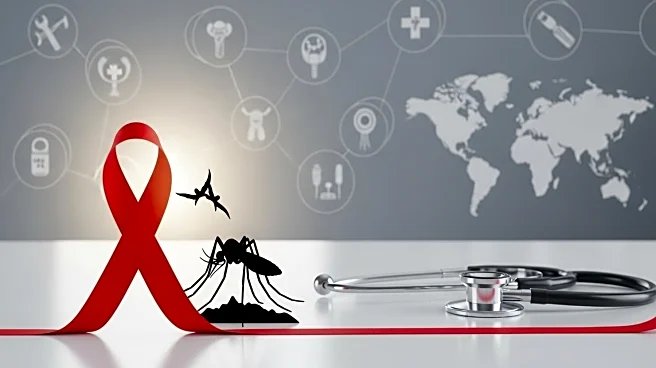What is the story about?
What's Happening?
Bill Gates has announced a pledge of $912 million through the Gates Foundation to combat AIDS, tuberculosis, and malaria, with a particular focus on Nigeria. This pledge matches the foundation's previous donation in 2022 and comes at a time when global development assistance has significantly decreased. Gates highlighted the severe risks faced by children in regions like northern Nigeria, where the child mortality rate is alarmingly high. The announcement was made during a Reuters Newsmaker event in New York, where Gates emphasized the importance of maintaining funding for global health initiatives, especially in light of reduced government aid worldwide. The Gates Foundation, established in 2000, is one of the largest funders of global health initiatives, focusing on reducing preventable deaths and tackling infectious diseases.
Why It's Important?
The pledge by Bill Gates is crucial as it addresses the funding gap created by a 21% drop in global development assistance between 2024 and 2025, which has reached a 15-year low. This reduction in aid threatens to reverse the progress made in reducing child mortality rates globally. The Gates Foundation's commitment is vital for sustaining efforts to combat diseases that disproportionately affect Africa, such as AIDS, tuberculosis, and malaria. These diseases continue to place a heavy burden on healthcare systems and contribute to high mortality rates, particularly among children and pregnant women. By prioritizing funding for organizations like the Global Fund and Gavi, the Vaccine Alliance, the Gates Foundation aims to save millions of lives and support innovations in healthcare.
What's Next?
Organizations like the Global Fund are racing to secure additional funds before the end of the year to prevent setbacks in global health progress. The Gates Foundation's pledge is expected to encourage other donors to contribute, helping to fill the funding gap left by reduced government aid. The focus will be on maintaining and expanding vaccination coverage, improving maternal healthcare, and rolling out new healthcare innovations. The success of these initiatives will depend on continued financial support and collaboration among international health organizations, governments, and private donors.
Beyond the Headlines
The decline in global development assistance highlights the challenges faced by international health organizations in sustaining progress against infectious diseases. The Gates Foundation's efforts underscore the ethical responsibility of wealthy individuals and organizations to contribute to global health, especially when government aid is insufficient. This situation also raises questions about the long-term sustainability of relying on private philanthropy to address public health challenges. The ongoing commitment of the Gates Foundation may inspire other philanthropists to increase their contributions, potentially leading to a shift in how global health initiatives are funded.














